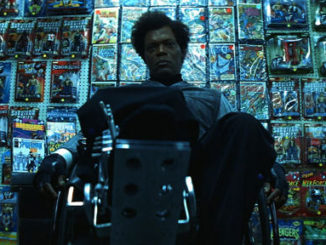While talking about Glass, the new M Night Shyamalan film that opened this past weekend , on our Facebook Live first impressions review, I noted that the ending of the film is certainly going to have people talking and debating about how things played out. And speaking with Entertainment Weekly, Shyamalan has elaborated on his intentions for the film’s finale and stated that in general terms this was always how he envisioned the story that he started with 2000’s Unbreakable would end.
And yes, there are spoilers for Glass.
As Glass comes to a close, Dennis Dunn (Bruce Willis), the multi-personality Kevin Wendell Crumb (James McAvoy) and Elijah “Mr. Glass” Price (Samuel L Jackson) are having their confrontation in the parking lot of the Raven Hill Psychiatric Center that they had been brought to by psychiatrist Dr. Ellie Staple (Sarah Paulson). After Crumb’s “The Beast” personality deals a fatal blow to Elijah, the police arrive and kill both him and Crumb. It is revealed that Dr. Staple is a member of a shadowy organization who monitors for the emergence of superhumans and then kills them before they become a danger to the general public. But Elijah Price has outsmarted her, and while she thought she has destroyed all evidence of the fight, video of the melee was sent to a private server, which then sent out notifications to Dunn’s son Joseph (Spencer Treat Clark ), Price’s mother (Charlayne Woodard) and Casey Cooke (Anya Taylor-Joy), a former kidnapping victim of several of Crumb’s personalities working in concert. The three then post the video online for the world to discover.
Understandably, people have definitely had strong reactions to how things ended. But at least thematically, it was something that Shyamalan had in mind from the beginning.
I always thought it was a little bit of like an opera, even when I was starting on Unbreakable. I thought this was a very operatic end to it all [with] people screaming and all of these kinds of implications. It was about implications more than anything. I’m a big fan of One Flew Over The Cuckoo’s Nest as you can probably tell. The format of that movie just blew me away when I saw it. The idea that the journey of the main character gets fulfilled by another character is a very powerful idea.
OK, if that is what he is going for – a character’s journey being fulfilled by another – that does make the ending make a bit more sense. And I can certainly see what he is reaching for in those final moments of Elijah’s mother, Joseph and Casey sitting in Penn Station as the video of the Ravenhill Memorial Hospital showdown begins to go viral. Elijah got his desire to have the existence of superhumans revealed to world fulfilled posthumously by the three.
But this also makes Elijah the film’s protagonist. Maybe not it’s hero, as he is still the guy who committed mass murder in his quest to find the superpowered person David Dunn turned out to be. And his character certainly doesn’t show that he has had a change of heart or has repented the deaths that he caused in any of his actions in Glass. But his is the character arc which is ultimately fulfilled across all three films. Certainly not the way things play out in more traditional superhero films.
Does this make the film any better in retrospect? Well, I still have issues with the third act’s construction and the heavy-handedness of some of the dialogue. But it does invite viewers to perhaps look at a new perspective about the narrative over all. Even with this film’s flaws, that makes Glass more interesting than any number of films that play it safer with their narratives.





